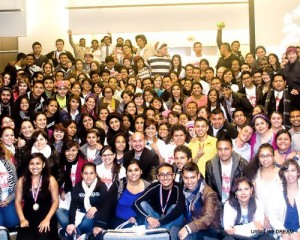 In the burgeoning legislative debate over immigration reform, leaders of the DREAMer movement of young aspiring Americans drew an important line in the sand this weekend. At a conference convened by United We Dream, one of the leading organizations created of, by, and for DREAMers, the organization’s members made it clear that they are fighting not only for a path to full citizenship for themselves, but also for each of the 11 million undocumented immigrants in the nation.
In the burgeoning legislative debate over immigration reform, leaders of the DREAMer movement of young aspiring Americans drew an important line in the sand this weekend. At a conference convened by United We Dream, one of the leading organizations created of, by, and for DREAMers, the organization’s members made it clear that they are fighting not only for a path to full citizenship for themselves, but also for each of the 11 million undocumented immigrants in the nation.
As UWD Managing Director Cristina Jimenez said, “We have an unprecedented opportunity to engage our parents, our cousins, our abuelitos in this fight.”
According to Lynn Tramonte, Deputy Director of America’s Voice Education Fund:
The DREAMers are leaders within their communities and their families. They know firsthand the sacrifices their parents made to provide opportunities for their children. They are incredible spokespeople for their families, and will once again transform the immigration debate.
As Julia Preston of the New York Times wrote:
The leaders of the United We Dream network, the largest organization of youths here illegally, decided to push President Obama and Congress next year for legislation to open a path to citizenship for them and their families. The move will increase pressure on Mr. Obama and lawmakers to pass a comprehensive overhaul, rather than taking on the debate over immigration in smaller pieces to try to gain more support among Republicans.
Miriam Jordan of the Wall Street Journal noted that the DREAMers have “found that their most effective tool was sharing personal stories…. Over the weekend, the narrative-and strategy-moved toward one that will include their family.”
An earlier front-page New York Times story by Preston captures why this development is so critical for political and policy reasons. Writes Preston:
Door-knocking campaigns led by those immigrants, who could not vote, mobilized many Latinos who could, based in no small part on the popularity of the [Deferred Action for Childhood Arrivals] program…Behind the political momentum, administration officials and advocates say, is an extensive and surprisingly adroit movement of youthful immigrants. Because of their illegal status, however, they have often been more influential than they have been visible…Now, movement leaders say, it is payback time. When Congress last debated broad reform, in 2007, populist energy was on the side of those opposing amnesty for illegal immigrants. Angry resistance from Republicans defeated a legalization proposal by President George W. Bush. This time the young immigrants are the rising force, and they seek legislation to give them a direct and permanent path to citizenship.
A path to citizenship is the undeniable requirement for legislation that resolves the status of DREAMers, their parents, and other good people in the U.S. without papers. “Anything less is un-American,” said Tramonte. “We don’t put people in second-class status in this country. That’s not what we’re about.”
While most Democrats are already on board with full citizenship, some Republicans have begun to talk about measures that confer a lesser type of immigration status. Beyond the moral reasons, there are also strong political reasons that Republicans should support full citizenship and equal status for undocumented immigrants.
As DREAM leader Lorella Praeli said asked Republicans, “Do you want your party to see the inside of the White House again? The Republican Party alienated Latino voters in ways they hadn’t done before…Our leverage is that our community is growing.”
“Immigrants and their allies won’t stop until Congress and the President provide a roadmap to citizenship for the 11 million undocumented immigrants in our country. If Republicans want to benefit both morally and politically from immigration reform, they need to go big and bold. That means a full path to citizenship,” Tramonte concluded.

